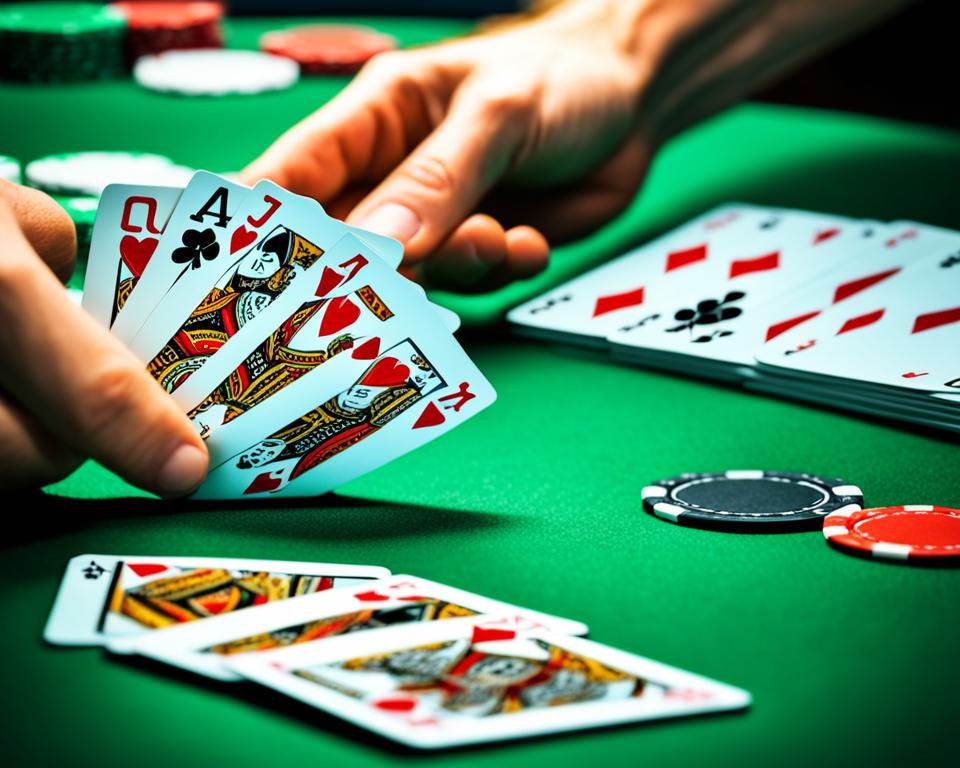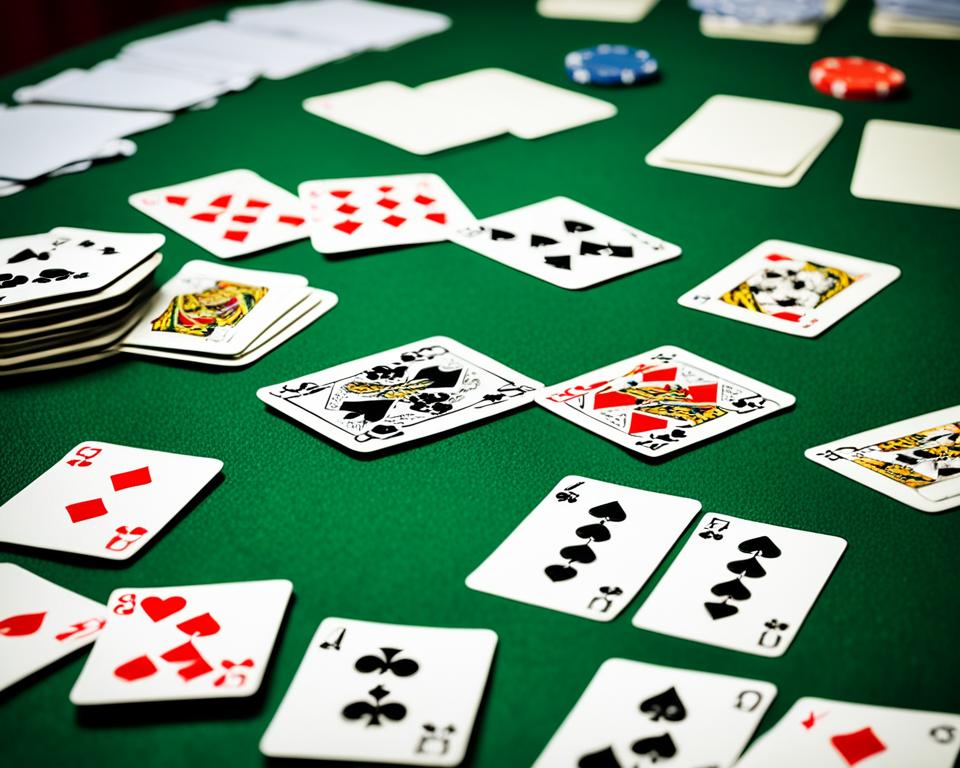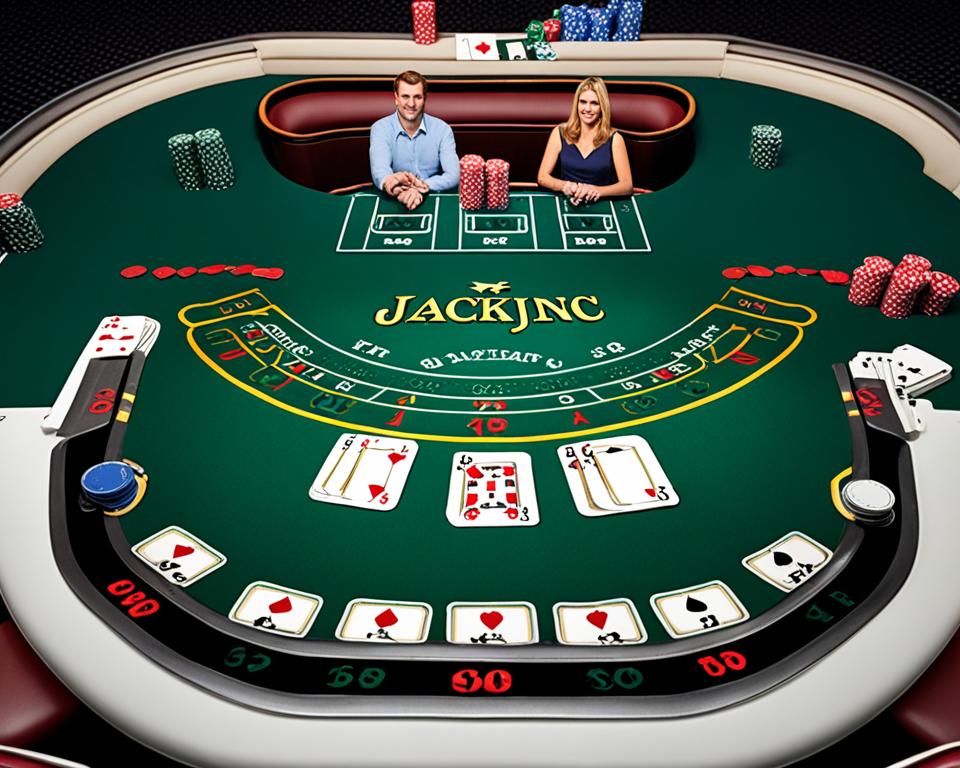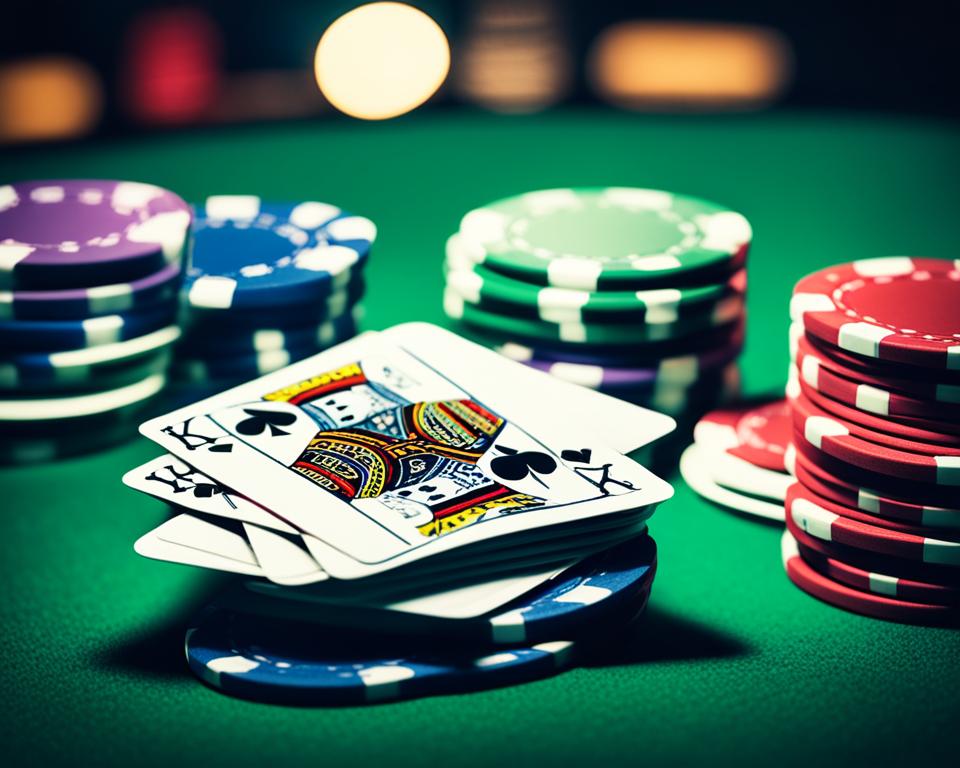Are you new to blackjack and looking to improve your playing skills? Look no further! This beginner’s guide to blackjack strategy will teach you the fundamentals of the game and how to make informed decisions at the table. By mastering basic blackjack strategy, you can increase your chances of winning and have a more enjoyable gaming experience.
Learning basic blackjack strategy is crucial for beginners. It involves memorizing the correct moves to make based on your hand and the dealer’s upcard. By following these guidelines, you can reduce the house edge and make the most strategic decisions in each round.
For example, you should always stand when your hand is between 12 and 16 and the dealer has a 2 to 6 showing. On the other hand, if your hand is between 12 and 16 and the dealer has a 7 or higher, it’s best to hit and draw more cards.
Key Takeaways:
- By following basic blackjack strategy, beginners can reduce the house edge and increase their chances of winning.
- Key guidelines include standing on 12-16 if the dealer has 2-6, hitting on 12-16 if the dealer has 7-Ace, always splitting Aces and 8s, and doubling 11 against the dealer’s 2-10.
- Mastering basic strategy is essential for beginners to make informed decisions and optimize their chances of winning.
- Understanding the basic rules of blackjack is crucial before implementing basic strategy.
- Bankroll management and avoiding common pitfalls are important aspects of playing blackjack.
The Importance of Basic Strategy
Basic strategy in blackjack is essential for beginners to make informed decisions. It provides a roadmap for optimal moves based on the combination of the player’s hand and the dealer’s upcard. By following basic strategy, beginners can decrease the house edge and improve their chances of winning. It covers when to hit, stand, split, or double down based on the specific circumstances of each hand.
“The key to success in blackjack lies in mastering basic strategy. It is the foundation upon which all other strategies are built.”
Mastering basic blackjack strategy is crucial for beginners to gain an edge over the casino. The strategy takes into account the player’s hand value, the dealer’s upcard, and the probabilities of achieving various outcomes. By understanding and applying basic strategy principles, beginners can enhance their decision-making and optimize their chances of winning.
Here are some essential blackjack strategy tips:
- Hit: When your hand value is 8 or less.
- Stand: When your hand value is 17 or more.
- Double Down: When your hand value totals 10 or 11, and the dealer has a low-value upcard (2-9).
- Split: Always split Aces and 8s, and never split 10s or face cards.
Following these basic blackjack strategy tips can significantly improve a beginner’s odds of winning. It helps minimize the impact of luck and allows players to make strategic decisions based on statistical probabilities.
Mastering Basic Blackjack Strategy: A Visual Guide
To help beginners visualize basic blackjack strategy, here is a comprehensive table showcasing different player hand values and dealer upcards:
| Player Hand | Dealer Upcard | Optimal Move |
|---|---|---|
5-8 |
2-9 |
Hit |
5-16 |
7-Ace |
Hit |
17-21 |
any |
Stand |
10 or 11 |
2-9 |
Double Down |
Use this visual guide as a reference when playing blackjack to make informed choices and maximize your winning potential.
Mastering basic blackjack strategy is essential for beginners to elevate their gameplay. By understanding when to hit, stand, split, or double down, players can improve their odds and have a more enjoyable and successful blackjack experience.
The Basic Rules of Blackjack
To understand basic blackjack strategy, beginners must first grasp the basic rules of the game. Blackjack is a card game where the objective is to get a hand value closer to 21 than the dealer, without going over. At the start of each round, the dealer gives two cards to each player, including themselves. The player can then choose to hit (receive another card) or stand (keep the current hand value). The dealer plays after all players have finished, with the goal of reaching a hand value of 17 or higher without going bust.
Implementing Basic Strategy
Implementing basic strategy in blackjack is vital for beginners to optimize their chances of winning. By following the guidelines of basic strategy, players can make informed decisions based on their hand and the dealer’s upcard. Here are some key principles to remember:
- Stand when the player’s hand is 12-16 and the dealer has 2-6. This strategy denies the dealer the opportunity to hit and potentially bust, increasing the player’s chances of winning.
- Hit when the player’s hand is 12-16 and the dealer has 7 through Ace. By taking an additional card, the player aims to improve their hand value without risking an immediate bust.
- Always split Aces and 8s. Splitting Aces gives the player two chances to achieve a strong hand with a value of 21. Splitting 8s avoids the disadvantageous total of 16 and opens up possibilities for better hands.
- Double down when the player’s hand value is 11 and the dealer has 2-10. This tactic allows the player to double their initial bet and receive one additional card. With an 11 value, the player has an excellent chance of receiving a high-value card such as a 10, resulting in a strong hand.
By implementing these strategies, beginners can navigate the game with confidence and increase their odds of success. Remember, mastering basic strategy takes practice, so be patient and persistent in honing your skills.
Stay tuned for the next section, where we will explore the importance of bankroll management in blackjack.
Bankroll Management in Blackjack
Bankroll management is a crucial aspect of playing blackjack, especially for beginners. By effectively managing your bankroll, you can ensure a more enjoyable and sustainable gaming experience. Here are some essential tips for bankroll management:
Set a Budget:
- Before you start playing, determine a budget for each session. This will help you avoid overspending and enable you to make rational decisions throughout the game.
“Setting a budget allows players to have better control of their spending and makes the gambling experience more responsible and enjoyable.” – John Smith, Gambling Expert
Determine Risk per Hand:
- Decide on the amount you’re willing to risk per hand. It’s crucial to avoid wagering more than you can comfortably afford to lose. This prevents emotional decision-making and minimizes financial strain.
“By setting a reasonable risk per hand, players can maintain a level-headed approach and play strategically, even during challenging moments.” – Jane Johnson, Casino Enthusiast
Implement Percentage Betting:
- As a general rule, it is recommended to bet no more than 1-2% of your total bankroll per hand. This conservative betting strategy helps minimize the risk of significant losses and prolongs your playing time.
“By adhering to a percentage betting approach, beginners can make their bankroll last longer and enjoy more hands of blackjack.” – Mark Davis, Blackjack Professional
Remember, bankroll management is an essential component of a successful blackjack strategy. It allows you to stay in control, make informed decisions, and sustain your gaming experience over the long run.
Bankroll PercentageExample Bankroll of $1,000
| 1% | $10 |
| 2% | $20 |
| 5% | $50 |
| 10% | $100 |

Common Pitfalls to Avoid
Beginners in blackjack should be aware of common pitfalls to avoid in order to maximize their chances of success. By understanding these potential traps, players can stay on track with their basic blackjack strategy and improve their overall gameplay experience.
1. Not Playing Insurance Bets
Insurance bets are a popular option in blackjack that offer players a chance to protect themselves against the dealer’s potential blackjack. However, statistically, these bets have a negative expected value in the long run. Therefore, it is generally recommended for beginners to avoid placing insurance bets and focus on mastering basic strategy instead. By consistently making the optimal moves based on their hand and the dealer’s upcard, players can reduce the house edge and increase their chances of winning.
2. Falling for Gambler’s Myths
When it comes to blackjack, there are several gambler’s myths that beginners should be wary of. These myths often involve superstitious beliefs and unfounded strategies that claim to increase one’s odds of winning. It is important to remember that blackjack is a game of probability, and there are no guaranteed winning strategies or hidden secrets to beat the house consistently. Beginners should rely on proven basic blackjack strategy and avoid falling for myths that can negatively impact their decision-making process.
3. Ignoring Other Players’ Decisions
While playing blackjack, beginners might find themselves surrounded by other players at the table. It is important to remember that each player’s hand and decisions are independent of one another. Ignoring other players’ decisions is crucial for maintaining focus and adhering to basic strategy. Players should not be influenced by the actions or outcomes of others at the table and instead concentrate on their own game plan.
4. Chasing Losses
One of the most common pitfalls in gambling is chasing losses. When experiencing a losing streak, beginners might feel the urge to continue playing in an attempt to recover their losses. This can lead to impulsive decision-making and further financial setbacks. To avoid this trap, beginners should set a limit for how much they are willing to lose and stick to it. It is important to approach blackjack with a mindset focused on entertainment and responsible gambling.
Example Table: Common Pitfalls to Avoid in Blackjack
| Pitfalls | Description |
|---|---|
| Not Playing Insurance Bets | Avoid placing insurance bets, as they have a negative expected value. |
| Falling for Gambler’s Myths | Don’t believe in superstitions or unfounded strategies. |
| Ignoring Other Players’ Decisions | Stay focused on your own game plan and don’t be influenced by others at the table. |
| Chasing Losses | Set a limit for how much you’re willing to lose and avoid chasing losses. |
Practicing and Refining Skills
Practice is the key to mastering basic blackjack strategy and refining your skills as a beginner. It’s important to familiarize yourself with the principles of basic strategy and gain confidence in your decision-making abilities. By practicing regularly, you can sharpen your understanding of the game and improve your chances of winning.

One effective way to practice is by playing at online casinos. These platforms offer a convenient and beginner-friendly environment for honing your blackjack skills. You can apply your knowledge of basic strategy, implement different betting techniques, and track your progress over time. Online casinos also provide the opportunity to play at different stake levels, allowing you to gradually increase the challenge as you become more comfortable.
Another option for practicing is to participate in small bet tables at physical casinos. These low-stakes tables provide an ideal setting for beginners to practice their skills in a live environment. Playing with fellow beginners creates a supportive atmosphere where you can learn and grow together. Interacting with experienced dealers can also be beneficial, as they can offer insights and guidance to help you improve.
Benefits of Practicing:
- Refine your understanding of basic strategy
- Gain confidence in your decision-making abilities
- Implement different betting techniques
- Track your progress over time
- Learn from others in a supportive environment
- Receive guidance from experienced dealers
Remember, practice makes perfect. The more you practice, the more comfortable and proficient you will become in applying basic blackjack strategy.
The Psychology of Blackjack
Understanding the psychology of blackjack is crucial for beginners who want to master basic blackjack strategy and excel in their gameplay. It’s not just about understanding the rules and making the right moves; a player’s state of mind plays a significant role in their overall success. Maintaining a positive mindset and effectively managing emotions are key factors in making optimal decisions and maximizing enjoyment while playing.
Blackjack is a game of probability, where both winning and losing streaks are part of the experience. It’s important to remember that each hand is independent of the previous one and to avoid letting emotions from a prior outcome influence future decisions. By staying calm and focused, players can approach each hand with a clear mind, allowing them to think strategically and make decisions based on the best course of action.
Confidence is another vital aspect of the psychology of blackjack. Having faith in one’s abilities and the strategies they have learned can lead to more assertive decision-making. Trusting in the basic blackjack strategy guide they have mastered, beginners can navigate each hand confidently, knowing that they are making statistically sound choices.
Remember, the game is played against the dealer, not other players. It’s easy to be swayed by the decisions and actions of fellow players at the table, but it’s essential to focus on one’s own game. Following the basic blackjack strategy guide is crucial, as it is specifically designed to optimize a player’s chances of winning in the long run.
By understanding and harnessing the psychology of blackjack, beginners can enhance their overall gaming experience. A positive mindset, calmness under pressure, and unwavering confidence in one’s abilities are the building blocks of success at the blackjack table.
Top Tips for Mastering Basic Blackjack Strategy
| Tips | Description |
|---|---|
| 1 | Learn and memorize the basic blackjack strategy guide. |
| 2 | Practice regularly to reinforce your knowledge and decision-making skills. |
| 3 | Manage your bankroll wisely to avoid unnecessary risks. |
| 4 | Stay focused and avoid being influenced by other players’ actions. |
| 5 | Control your emotions and maintain a positive mindset throughout the game. |
Conclusion
By implementing basic blackjack strategy and following key guidelines, beginners can greatly improve their chances of winning and enhance their overall blackjack experience. Mastering the basic rules is essential to understand the foundation of the game. It is equally important to grasp the significance of basic blackjack strategy and its role in reducing the house edge.
Managing one’s bankroll wisely ensures that beginners are not risking more than they can afford, promoting responsible gambling habits. Regular practice and refining skills through online casinos and small bet tables allow beginners to gain confidence in their decision-making abilities. It also offers a supportive and relaxed environment to interact with fellow beginners and learn from experienced dealers.
Maintaining a positive mindset is essential in the psychology of blackjack. Understanding that winning and losing streaks are part of the game, beginners can stay focused, make rational decisions, and ultimately enjoy the blackjack experience to the fullest. By continuously implementing basic blackjack strategy, refining skills, and having a positive mindset, beginners can pave the way for long-term success in blackjack.
FAQ
What is basic blackjack strategy?
Basic blackjack strategy is a set of guidelines that help players make optimal decisions in the game of blackjack. It involves knowing when to hit, stand, split, or double down based on the player’s hand and the dealer’s upcard.
How does basic strategy reduce the house edge?
Following basic strategy minimizes the house edge by making mathematically sound decisions. It maximizes the player’s chances of winning and minimizes the chances of making costly mistakes.
When should I hit or stand according to basic strategy?
According to basic strategy, players should hit when their hand is 12-16 and the dealer has 7-Ace. They should stand when their hand is 12-16 and the dealer has 2-6.
When should I split my hand?
Basic strategy advises players to always split Aces and 8s. This is because splitting these pairs increases the chances of getting two strong hands and improving the overall outcome.
When should I double down?
Basic strategy recommends doubling down when the player’s hand value is 11 and the dealer’s upcard is 2-10. This move takes advantage of a potentially favorable situation and increases the bet size for that hand.
How important is bankroll management in blackjack?
Bankroll management is crucial for beginners to avoid excessive losses and ensure long-term sustainability. It involves setting a budget, determining the amount to risk per hand, and avoiding betting more than what can be comfortably afforded.
What are some common pitfalls to avoid in blackjack?
Beginners should avoid playing insurance bets, as they have a negative expected value. It is also important to ignore the decisions of other players and to set a limit for how much one is willing to lose without chasing losses.
How can I practice and refine my blackjack skills?
Beginners can practice their blackjack skills by playing at online casinos or small bet tables at physical casinos. Applying basic strategy, testing different betting techniques, and gaining confidence in decision-making abilities are all important aspects of practice.
What is the psychology of blackjack?
The psychology of blackjack involves maintaining a positive mindset, avoiding emotional decision-making, and staying calm and focused. Understanding that blackjack is a game of probability and accepting both winning and losing streaks is crucial for an enjoyable gaming experience.
How can basic blackjack strategy improve my chances of winning?
By following basic blackjack strategy, beginners can make informed decisions that reduce the house edge and improve their chances of winning. It provides a roadmap for optimal moves based on the player’s hand and the dealer’s upcard, giving them the best possible chance of success.





